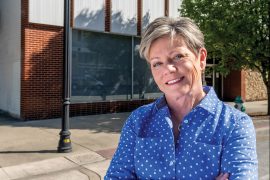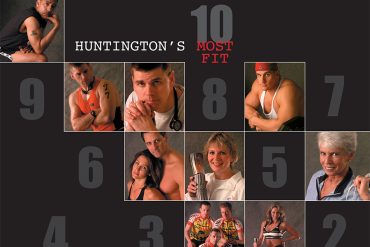Woodlands Retirement Community just keeps getting better under the stewardship of a strong board and a forward-thinking leader.
By James E. Casto
HQ 107 | AUTUMN 2019
“I came here with no expectations,” said Jeff Harkins, chief executive officer of the Woodlands Retirement Community. “But over time I’ve truly fallen in love with the place, its staff and its residents.”
Woodlands, an impressive castle-like cluster of buildings perched on a wooded hilltop off State Route 152 just south of Huntington, houses more than 260 residents in 158 one- and two-bedroom apartments, 22 cottages and the assisted living/health care wing.
It’s been welcoming residents 55 and older since it opened its doors in 1996. In 2014, the facility welcomed Harkins as its new CEO.
A Kansas native and University of Kansas graduate, Harkins came to Huntington after working in the management of continuing care communities in a half-dozen states.
“I feel fortunate that in taking over at Woodlands I have been able to build on a foundation put in place by our board and my predecessor, Larry Mabry,” Harkins said.
And, in another piece of good fortune, Woodlands received a $1 million gift from an anonymous donor in 2015 that Harkins said enabled him to complete a number of projects that had been on the drawing board for several years.
“Today, we’ve been able to turn some of our dreams into reality,” Harkins explained. “We’ve opened the Bistro, an alternative dining experience and a spot for happy-hour fun. We now have a modern wellness center, with a room of exercise equipment and another for group exercising. We renovated our activity room, purchased new chairs for our dining room and Hampton meeting room, purchased a badly needed 14-passenger bus and, importantly, undertook an electronic update of our medical records.”
Next on the agenda: improvements to Woodlands’ park-like setting.
“Our grounds are already beautiful, but we think there’s great potential to make them even more so,” Harkins said. “We’re working on a master plan.”

Aubrey King, president of the Woodlands Resident Council, has nothing but praise for Harkins — and for Woodlands. King and his wife Mary Margaret met and fell in love when they were students at Marshall University. After graduating and marrying, they lived in Maryland for more than 50 years. When they started planning for retirement, they liked the idea of a continuing care community but were unsure of where to go.
“We visited more than half a dozen ranging from Pennsylvania to South Carolina, but we kept coming back to the Woodlands,” King said. “In part that was because we were familiar with Huntington. But what really motivated our choice was the friendliness of the people, both the staff members we dealt with and the residents we met.”
As president of the Resident Council, King works closely with Harkins and has come to respect his ability to perform a difficult job.
“Whatever it is — a leaking roof, a complaint about the food in the dining room, a problem with services in the health care unit, whatever — it all lands on his desk and he handles it fairly and professionally,” King said. “He balances all those demands quite well. And he has a great sense of humor. That helps a lot.”

Harkins is constantly searching for little touches to make Woodlands feel like home. When he heard people frequently recalling good times they enjoyed at Huntington’s long-gone Rebels and Redcoats Tavern, he tried to find the restaurant’s old sign. Unable to do so, he had Paris Signs craft an exact replica, which now hangs at the Bistro.
The late Lloyd Frankel enjoyed welcoming guests to Rebels until his death in 1986. His widow, Maxine Frankel, is now a Woodlands resident.
“She was thrilled when she saw the Rebels sign,” Harkins said.
Woodlands might never have come to be were it not for the public-spirited generosity of one of early Huntington’s leading businessmen, Bradley W. Foster (1834-1922), who opened the city’s first hardware store and built it into a major regional wholesale firm. Foster and his wife, Mary, had no children. When he died, he left $800,000 to build and operate a home for unmarried women and widows.
Over the years, the Foster Memorial Home for Aged Women, erected on Madison Avenue in Huntington, sheltered thousands of local women, but times change. Beginning in the 1980s, the Foster Foundation’s board began talking about the growing need for adequate housing for all seniors, not just women. The result was the construction of Woodlands, today’s sprawling retirement community.
In 1985, Rev. Gray Hampton, a member of the Foster Foundation board, introduced board members to the continuing care retirement community (CCRC) concept. Under his leadership, the board developed a plan to broaden the scope of the aging Foster Memorial Home into a CCRC in Huntington. Starting in 1988 and over the course of a decade, Chairman William F. “Bill” Agee and the board turned that vision into reality.

On Aug. 19, 1996, Woodlands opened with 111 apartments. Over the next few years, additional apartments and 23 cottages were built. In 2004, the assisted living/health care wing of Woodlands was expanded with the substantial involvement of the late Joan C. Edwards and the West Virginia Episcopal Diocese.
Two of the original residents at Woodlands were Robert and Barbara Brown. Robert passed away in 2014 after 18 years at Woodlands, but his widow Barbara still calls Woodlands home.
“I can’t imagine living anywhere other than Woodlands,” she said. “It’s a wonderful home because anytime I have a need, I can just go out and peck on my neighbor’s door.”





